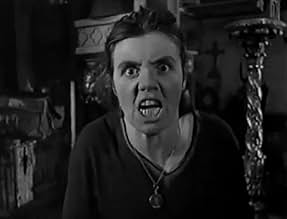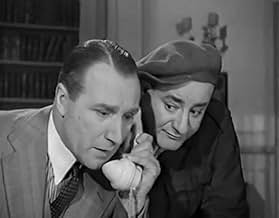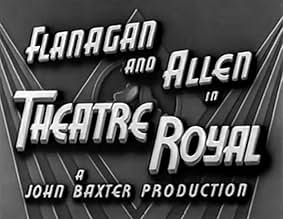Though the manager from a famed theatrical family is broke and wants to close his theatre, his staff loyally stands by him, and put together their own show to keep it from falling into a riv... Read allThough the manager from a famed theatrical family is broke and wants to close his theatre, his staff loyally stands by him, and put together their own show to keep it from falling into a rival producer's hands.Though the manager from a famed theatrical family is broke and wants to close his theatre, his staff loyally stands by him, and put together their own show to keep it from falling into a rival producer's hands.
- Director
- Writers
- Stars
Victor Feldman
- And His Orchestra
- (uncredited)
Toni Gable
- Annie the maid
- (uncredited)
Hal Gordon
- Gambler
- (uncredited)
- Director
- Writers
- All cast & crew
- Production, box office & more at IMDbPro
Featured reviews
Flanagan and Allen were a British two-act. Americans may think of Abbot & Costello, except for this pair, at least, the comic's name comes first and the straight man's second. This one has enough of a plot to make sense: Allen is a theater manager and Flanagan is a stage hand. Allen's girl friend has been talking him into producing high-class stuff that involves her wandering around a swamp, picking dandelions. No one wants to see this, but fortunately Allen's loyal staff is willing to back him in one last try, hoping his girl friend doesn't talk him into another expensive flop.
This is all being masterminded by Owen Reynolds, who was tossed out by Allen's father for stealing. Along comes Finlay Currie, sporting an American accent, who wishes to hire the theater...
Although not as fast-paced as the Crazy Gang comedies the two had last appeared in, this is a pleasant bit of wartime fluff for the British home market. Flanagan and Allen take a break from their routines to sing a pleasant song or three and it's good to see Mr. Currie in this sort of a role -- Americans are so used to seeing him being the Old & Noble Scottish Laird, that it's a pleasant change to see him doing something a bit different.
This is all being masterminded by Owen Reynolds, who was tossed out by Allen's father for stealing. Along comes Finlay Currie, sporting an American accent, who wishes to hire the theater...
Although not as fast-paced as the Crazy Gang comedies the two had last appeared in, this is a pleasant bit of wartime fluff for the British home market. Flanagan and Allen take a break from their routines to sing a pleasant song or three and it's good to see Mr. Currie in this sort of a role -- Americans are so used to seeing him being the Old & Noble Scottish Laird, that it's a pleasant change to see him doing something a bit different.
Although I did not see the Crazy Gang live,I did see Bud and Ches live,albeit separately.Bud I saw at the last night gala at the Golders Green Hippodrome,eight months before his death.So it may have been his last stage performance.Ches I saw at the Prince of Wales theatre singing Strollin,with Roy Hudd in a celebration of the crazy Gang.This film is less anarchic than the others they made for John Baxter.However it is still very entertaining.Bud was and is one of my all time favourites.
Finlay Currie was still playing Americans, Lydia Sherwood was still young & glamorous enough to play a chic femme fatale and blackface was still considered a harmless bit of fun in this, the second of producer-director John Baxter's four films with Flanagan & Allen; of which it's easily the least.
The enormous production numbers probably consumed most of the film's budget; while the surreal heights reached by the two films that followed are anticipated by a short dream sequence when Bud Flanagan nods off and he and Chesney Allen briefly impersonate Francis Drake & Walter Raleigh.
The enormous production numbers probably consumed most of the film's budget; while the surreal heights reached by the two films that followed are anticipated by a short dream sequence when Bud Flanagan nods off and he and Chesney Allen briefly impersonate Francis Drake & Walter Raleigh.
A light-hearted British musical comedy from WWII.
An old theatre has seen better days. The original owner (Maxwell) was very successful, but his son (who now manages the theatre) has managed to loose all his money and wants to close the theatre. However the staff decides to rescue the theatre by staging a play and doing the acting themselves.
Most of the financial troubles of the theatre are actually the result of a rival company that is doing everything they can to make sure that every show flops.
Eventually an American comes to the rescue with a proposal.
The humour requires some understanding of the older British ways (especially pounds, shilling and pence).
All in all it is a good example of the war weary British musical comedies (low budget, simply story, quickly delivered comic lines). The English had just gone through four year of terrible war and were filled with hope that now that the Americans had entered the war that soon the war would end and the future would be bright. They expected great times would come again and that America would now change from a nation that was isolationist to a nation that would participate in world affairs.
This musical comedy clearly expresses that hope.
It is worth watching, though not the type of movie you will want to watch repeatedly.
An old theatre has seen better days. The original owner (Maxwell) was very successful, but his son (who now manages the theatre) has managed to loose all his money and wants to close the theatre. However the staff decides to rescue the theatre by staging a play and doing the acting themselves.
Most of the financial troubles of the theatre are actually the result of a rival company that is doing everything they can to make sure that every show flops.
Eventually an American comes to the rescue with a proposal.
The humour requires some understanding of the older British ways (especially pounds, shilling and pence).
All in all it is a good example of the war weary British musical comedies (low budget, simply story, quickly delivered comic lines). The English had just gone through four year of terrible war and were filled with hope that now that the Americans had entered the war that soon the war would end and the future would be bright. They expected great times would come again and that America would now change from a nation that was isolationist to a nation that would participate in world affairs.
This musical comedy clearly expresses that hope.
It is worth watching, though not the type of movie you will want to watch repeatedly.
Did you know
- TriviaA man placed his coat on the ground so a woman wouldn't have to walk in the mud, when she stepped on the coat she fell into a deep hole. Ringo Starr did the same gag in "A Hard Day's Night".
- SoundtracksRoll On Tomorrow
(uncredited)
Music by Kennedy Russell
Lyrics by Desmond O'Connor
Sung by Bud Flanagan and Chesney Allen
Details
- Release date
- Country of origin
- Language
- Also known as
- Glada flugan
- Filming locations
- National Studios, Elstree, Hertfordshire, England, UK(studio: made and produced at National Studios Elstree)
- Production company
- See more company credits at IMDbPro
- Runtime1 hour 41 minutes
- Color
- Aspect ratio
- 1.37 : 1
Contribute to this page
Suggest an edit or add missing content












